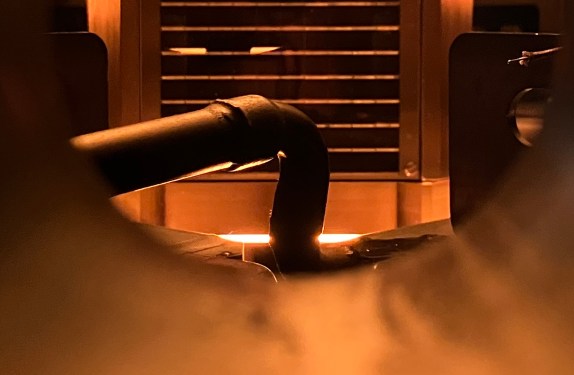Fourth Power’s approach to long-duration energy storage sounds like something from a James Bond film. Their thermal batteries feature superheated liquid tin and argon-filled hermetically sealed chambers. The company’s goal, however, is far more practical: to store electricity cheaply enough to make solar and wind an obvious choice for 24/7 power.
Here is how the technology works. To store energy, electricity from the grid heats blocks of carbon inside insulated chambers filled with argon gas. When power is needed, the system pumps molten tin heated to a scorching 2,400 degrees Celsius through graphite pipes, which are the only cost-effective material that can withstand those temperatures. Special solar panel-like devices called thermophotovoltaic cells then convert the heat back into electricity by capturing the white-hot tin’s infrared light.
The four-year-old startup from Cambridge, Massachusetts, has been refining the technology for the last two years. It is now preparing to build its first full-scale battery, complete with molten tin. If all goes to plan, Fourth Power intends to deliver commercial-scale batteries to customers in 2028 at a cost that could undercut both lithium-ion batteries and natural-gas peaking plants.
The company’s co-founder and CEO, Arvin Ganesan, stated that their projections show the first systems to market will be cost competitive, noting their comparisons for these markets are very high.
In normal operation, Fourth Power envisions its batteries charging and discharging daily, providing continuous electricity for around eight hours or more. That is twice as long as most grid-scale lithium-ion batteries are designed for. The insulation system, made from petroleum coke, a waste product from oil refining, keeps temperatures remarkably stable, losing only one percent of stored energy per day.
The company is currently running extensive testing on smaller versions of the system to ensure it delivers the expected power output and is durable. Alongside these tests, Fourth Power is designing a one-megawatt-hour demonstration battery. To build that project, the company has raised twenty million dollars in a funding round it calls a Series A Plus. The round was led by Munich Re Ventures with participation from Breakthrough Energy Ventures and DCVC. The startup previously raised a nineteen million dollar Series A in 2023.
Ultimately, Fourth Power hopes that once it reaches large-scale production, the cost of storing electricity using its thermal batteries will fall to twenty-five dollars per kilowatt-hour. That would be one-tenth the cost of lithium-ion batteries. The company believes this target is achievable due to the system’s simplicity and the limited number of players in its supply chain.

